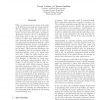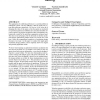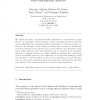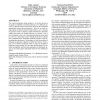Presentation
CP
2003
Springer
13 years 9 months ago
2003
Springer
Mechanism design is the art of designing the rules of the game (aka. mechanism) so that a desirable outcome (according to a given objective) is reached despite the fact that each a...
SIGECOM
2003
ACM
13 years 9 months ago
2003
ACM
Often, an outcome must be chosen on the basis of the preferences reported by a group of agents. The key difficulty is that the agents may report their preferences insincerely to m...
ACMICEC
2003
ACM
13 years 9 months ago
2003
ACM
The aggregation of conflicting preferences is a central problem in multiagent systems. The key difficulty is that the agents may report their preferences insincerely. Mechanism ...
ICALP
2004
Springer
13 years 9 months ago
2004
Springer
We initiate the study of mechanisms with verification for one-parameter agents. We give an algorithmic characterization of such mechanisms and show that they are provably better ...
ATAL
2004
Springer
13 years 9 months ago
2004
Springer
We define trust-based mechanism design as an augmentation of traditional mechanism design in which agents take into account the degree of trust that they have in their counterpar...
SIGECOM
2004
ACM
13 years 9 months ago
2004
ACM
The revelation principle is a cornerstone tool in mechanism design. It states that one can restrict attention, without loss in the designer’s objective, to mechanisms in which A...
SIGECOM
2004
ACM
13 years 9 months ago
2004
ACM
Often, an outcome must be chosen on the basis of the preferences reported by a group of agents. The key difficulty is that the agents may report their preferences insincerely to m...
WINE
2005
Springer
13 years 9 months ago
2005
Springer
This paper takes the first steps towards designing incentive compatible mechanisms for hierarchical decision making problems involving selfish agents. We call these Stackelberg p...
ATAL
2005
Springer
13 years 10 months ago
2005
Springer
The central mechanism design problem is to develop incentives for agents to truthfully reveal their preferences over different outcomes, so that the system-wide outcome chosen by ...





